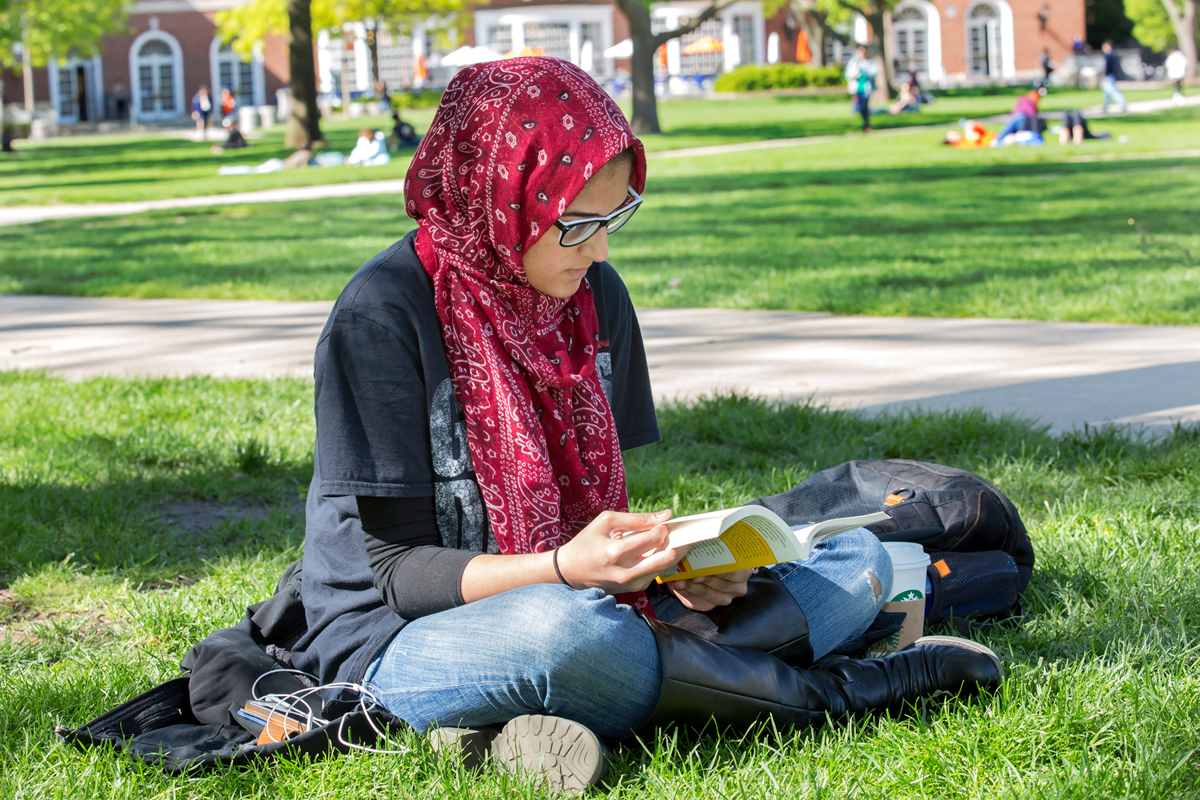Global Studies
Global Studies is an interdisciplinary undergraduate major that provides a strong foundation in the analysis of contemporary global issues through coursework, research, and experiential learning including study abroad. Through the major, students will learn to 1) combine theories and methods of multiple social science disciplines to view the most pressing global issues from a variety of perspectives; 2) utilize advanced language and cultural skills to work professionally with diverse groups of people; 3) apply specialized skills and expertise to address global challenges that suit their strengths and interests.
The major consists of three principle components: interdisciplinary global studies foundations, language and culture studies (including study abroad), and thematic areas. Students work with an academic advisor to construct an individualized Plan of Study that reflects their interests, goals and proficiencies, taking courses in a number of departments to enrich, complement, and coordinate knowledge of other cultures and global processes from an interdisciplinary perspective. The competencies established through the Global Studies major prepare students for careers in business, public policy, international affairs, government, law, public health, non-profit sector, communications, education, and sustainable development among other areas.
Each student chooses one thematic area (or approved combination of relevant areas):
Students declaring this thematic area specialize in understanding the bearings of a globalized world on the culture, traditions, religion, social interactions and assimilation of different population groups. The medium of this cultural exchange can be migration of people, international trade in goods and services, globalization of business strategies and pervasive presence of media and advertising. Students expand their knowledge horizons by learning about the socio-cultural beliefs and lifestyles of other ethnicities, nationalities, religions and gender. This enables them to develop their own local and global identities and embrace cultural diversity around them. Students gain practical skills such as communication strategies, social action strategies and effective decision-making strategies that can help them to negotiate competing interests in an increasingly multicultural workplace.
This thematic area is a good fit for students who are interested in studying scientific and human aspects of environment and sustainability. Scientific aspects of environment include land restoration, strategies to control pollution, efficient use of energy resources and discovering sustainable ways of living in a world facing climate change. The human aspect of ESSR may include topics such as environmental justice, corporate social responsibility, implementation of green business strategies, politics and economics of conservation etc. Students learn about the efforts being made in the area of environmental sustainability and how they might be extended to preserving vulnerable populations, flora and fauna. Students also learn methods to become active participants in the environmental sustainability movement at the global level.
Students who wish to learn about the causes and consequences of disparities in health conditions, health practices and health care systems declare Global Health as a thematic area. Additionally, students who are driven by the desire of providing equal access to health resources or develop cultural tolerance towards alternative medical systems may also declare this thematic area. Students of Global Health study social aspects of health provision and methods of overcoming these obstacles at the global level. They build their knowledge base by learning about health systems in United States and abroad, racial and ethnic inequalities in health care provision, the customs dominating health care systems in other cultures and health policy implementation at the national and global levels. Students also work towards understanding the importance of global achievement of the millennium development goals and how better health outcomes can aid sustainable development around the world.
This thematic area in LAS Global Studies is ideal for students who wish to study world security and global governance in a holistic fashion. Students of GCR adopt an interdisciplinary perspective of approaching international relations, conflict and security, diplomacy and conflict resolution and global peace; instead of relying on a single academic discipline to build their knowledge base. Students in GCR benefit from adopting an open-minded attitude towards global governance, and realize the importance of multiple actors and agencies to solve world problems. The ability to develop skills of logic, diplomacy, negotiation, conflict management and politics from the point of view of multiple actors is a crucial skill to survive in a multilateral world.
The thematic area in human rights is designed for students who are passionate about the provision of equal opportunity to all human beings. Students who wish to identify the prevalent inequalities in the world and in different social settings, understand the root of these disparities and work towards the elimination of such discrimination where possible, declare human rights as their thematic area. The coursework students undertake helps them to understand social differences and their effect on human rights, helps them develop ethical responses to human rights abuses and teaches them skills to successfully advocate for human rights of various interest groups. Students in this thematic area can also choose to specialize in group rights of different kinds, instead of gaining general knowledge.
The ability to communicate and learn about communities beyond our immediate social circle has been the one of the biggest gifts of globalization. The tools that have made it possible are language and information technology. Students who declare KCIS as a thematic area work towards the understanding of these information and communication chains and how they create global knowledge systems and information systems. They explore the role of language, education and information technology as enablers of social, economic and political change around the world. A student might take coursework that helps them understand the interrelated processes of globalization, communication and knowledge disbursement through various medium such as internet, education, tourism and news and popular media. Students who are interested in understanding the logistics of information transfer, knowledge flows and effective communication strategies might also declare KCIS as a thematic area.
The thematic area in Wealth & Poverty helps students to understand the causes and consequences of poverty and inequality in the world. Students interested in this thematic area learn about why some countries are richer than others, the challenges to development faced by the global south and how globalization can improve and worsen the conditions of the extremely poor. Students that are interested in community development, international development, economic growth, international trade, foreign aid or political economy of development can declare Wealth & Poverty as a thematic area. The students in this thematic area study the Millennium Development Goals and the agenda for sustainable development in depth as well.
- GLBL 100—Intro to Global Studies
- GLBL 220—Governance
- GLBL 240 - Global Health
- GLBL 250 - Development
- GLBL 260 - Global Human Rights
- GLBL 296—Global Studies Foundation Seminar
- Go here and see Interdisciplinary Foundations for courses offered by several social science departments (Anthropology, Economics, Geography, History, Political Science, and Sociology).
Students should consult with an academic advisor regarding course selection prior to the advanced registration period.
The Global Studies major prepares students for today's highly competitive global markets, in which flexibility and cultural competency are essential. Professionals are expected to undertake a variety of different tasks, and they may be stationed at a variety of locations around the globe and/or work with in an intercultural setting. This major provides students with a set of core competencies and experiences that make them, as graduates, highly attractive to global corporations, non-governmental organizations, and the public sector (e.g., State Department, CIA, USAID).
- Cross-cultural and international analysis
- Economic and political analysis,
- Quantitative and qualitative research
- Historical and cultural analysis
- Professional written and spoken communication skills
- Advanced foreign language and cultural proficiency
- Problem-solving and critical thinking skills
- Congressional Aide
- Economist
- Foreign Language Teacher
- Foreign Service Officer
- Global Health Policy Analyst or Practitioner
- Immigration Lawyer
- International Aid Worker
- International Banker
- International Trade Specialist
- Interpreter or Translator
- Journalist
- Labor Relations Specialist
- Policy Analyst
- Professor
- Program Officer at an NGO
- Public Relations Specialist
- Tourism Specialist
Some careers may require education beyond an undergraduate degree.
- Participating in undergraduate research
- Applying for a study abroad experience
- Utilizing resources of The Career Center
- Joining a Registered Student Organization (RSO) related to this major, such as:
- AIESEC Illinois: serve as an international platform for young people to explore and develop their leadership potential to create a positive impact in society.
- Model United Nations Illinois: provides members with opportunities to participate in United Nations simulations on the national circuit, utilizing their passion for world issues and strengthening skills in negotiation, research, persuasion, writing, and public speaking.
- Other Global Studies Focused RSOs.
There are several professional organizations dedicated to Global Studies. Their websites might be able to provide a glimpse in the world of Global Studies. These organizations include Global Studies Research Network and Global Studies Association.


